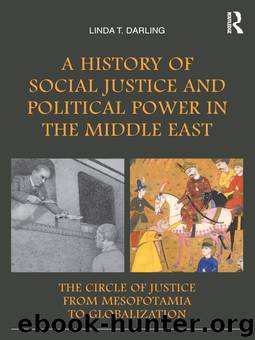A History of Social Justice and Political Power in the Middle East by Darling Linda T

Author:Darling, Linda T.
Language: eng
Format: epub
Publisher: Taylor & Francis (CAM)
Published: 2013-08-10T16:00:00+00:00
4 The Islamic empire
1 A detailed survey of Islamic history is M. G. S. Hodgson, The Venture of Islam: conscience and history in a world civilization, 3 vols, Chicago, IL: University of Chicago Press, 1974. Reference: H. A. R. Gibb, J. H. Kramers, E. Lévi-Provonçal, J. Schacht, B. Lewis, and C. Pellat (eds) The Encyclopaedia of Islam, 2nd ed., Leiden: Brill, 1954–2004 (hereafter EI2).
2 The term “Islamicate” refers to a civilization in which Islam does not determine everything, but where cultural elements even in non-religious spheres are associated with the dominant religion; Hodgson, Venture, 1: 57–60. On Islamicate society: M. G. Morony, Iraq after the Muslim Conquest, Princeton, NJ: Princeton University Press, 1984, 507–26; I. M. Lapidus, “The Arab Conquests and the Formation of Islamic Society,” in G. H. A. Juynboll (ed.) Studies on the First Century of Islamic Society, Carbondale: Southern Illinois University Press, 1982, 49–72.
3 This process gave Islamic civilization a universal appeal it might not otherwise have had. “Had Islam continued to be ruled from the secluded oases of central Arabia or from a poor and inaccessible region like the central Maghrib, it might have preserved a certain religious purity, but it would never have become the lasting cultural force it did become”; O. Grabar, The Formation of Islamic Art, New Haven, CT: New Haven, CT: Yale University Press, 1973, 35. That this argument must be made is a measure of the theoretical completeness of Arab-Islamic cultural hegemony.
4 EI2, s.v. “ Ḳānūn, iii – Financial and Public Administration”; see E. I. J. Rosenthal, Political Thought in Medieval Islam: an introductory outline, Cambridge: Cambridge University Press, 1962, repr. Westport, CT: Greenwood, 1985, 22. Ḥadīth and other evidence confirms Wellhausen’s argument that the Arab conquest and the Islamic faith were two separate projects for about the first hundred years; S. Bashear, Arabs and Others in Early Islam, Princeton, NJ: Darwin, 1997, 116, 118; F. M. Donner, “From Believers to Muslims: confessional self-identity in the early Islamic community,” Al-Abḥāth 50–1, 2002–3: 9–53.
5 Qur’ān 107: 1–3, English version A. J. Arberry, The Koran Interpreted, New York: Macmillan, 1955, 2: 351. Caring for widows and orphans and the weak was similarly lauded in the Bible (e.g. James 1: 27) and became one aspect of the Christian definition of justice; W. S. Monroe, “Via Iustitiae: the Biblical sources of justice in Gregory of Tours,” in K. Mitchell and I. N. Wood (eds) The World of Gregory of Tours, Leiden: Brill, 2002, 105.
6 “As for the orphan, do not oppress him, and as for the beggar, scold him not”; Qur’ān 93: 10–11, Arberry, Koran, 2: 342. The idea of justice as a mean or balance (qist), present in both Greek and Persian thought, was also influential in the Islamic concept of justice. The Qur’ān, however, usually advocated justice in the sense of bearing witness without bias (Qur’ān, 4: 135, 5: 8), and in the sphere of Islamic law and the courts, justice (‘adāla, defined as uprightness or probity) tended to be regarded more as
Download
This site does not store any files on its server. We only index and link to content provided by other sites. Please contact the content providers to delete copyright contents if any and email us, we'll remove relevant links or contents immediately.
| Anthropology | Archaeology |
| Philosophy | Politics & Government |
| Social Sciences | Sociology |
| Women's Studies |
The Secret History by Donna Tartt(19090)
The Social Justice Warrior Handbook by Lisa De Pasquale(12190)
Thirteen Reasons Why by Jay Asher(8912)
This Is How You Lose Her by Junot Diaz(6887)
Weapons of Math Destruction by Cathy O'Neil(6281)
Zero to One by Peter Thiel(5802)
Beartown by Fredrik Backman(5755)
The Myth of the Strong Leader by Archie Brown(5508)
The Fire Next Time by James Baldwin(5446)
How Democracies Die by Steven Levitsky & Daniel Ziblatt(5219)
Promise Me, Dad by Joe Biden(5153)
Stone's Rules by Roger Stone(5088)
A Higher Loyalty: Truth, Lies, and Leadership by James Comey(4964)
100 Deadly Skills by Clint Emerson(4926)
Rise and Kill First by Ronen Bergman(4789)
Secrecy World by Jake Bernstein(4753)
The David Icke Guide to the Global Conspiracy (and how to end it) by David Icke(4720)
The Farm by Tom Rob Smith(4514)
The Doomsday Machine by Daniel Ellsberg(4490)
